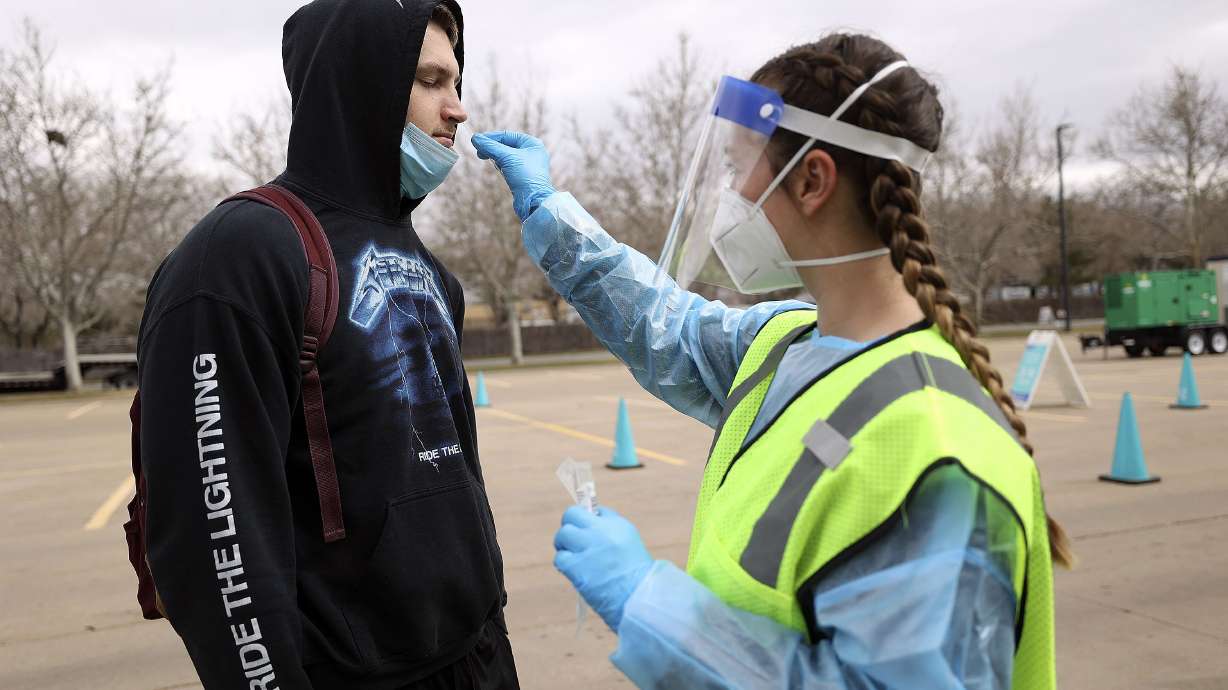Estimated read time: 5-6 minutes
This archived news story is available only for your personal, non-commercial use. Information in the story may be outdated or superseded by additional information. Reading or replaying the story in its archived form does not constitute a republication of the story.
SALT LAKE CITY — Utah appears to be stocked up on COVID-19 tests, treatments and vaccines amid a warning that the federal government's supplies could soon be depleted as the White House wrangles with Congress over funding the Biden administration's pandemic response.
The Utah Department of Health declined to comment on the impact of the Biden administration's COVID-19 plan not yet securing support despite the White House saying this week that money is running out to purchase everything from antiviral treatments to booster doses of vaccines that are distributed to the states.
But the state health department provided information on what Utah has on hand, how long those supplies are expected to last, and what, if any, changes are being considered in distribution, especially under Gov. Spencer Cox's efforts to shift Utah away from a pandemic response to the virus by the end of the month.
The state currently has more than a million COVID-19 tests, including 149,500 PCR sample collection kits and some 677,000 at-home rapid tests, according to department spokeswoman Charla Haley. There should be enough rapid testing kits to last at least six months, she said, and more of both the on-site and at-home tests have been ordered.
She said the nearly 176,000 rapid antigen tests the state has on hand are not the same brand as those that halted rapid antigen testing at state sites last month because of a much higher rate for false negatives than expected. Rapid testing has not resumed at state sites, most of which are set to close by March 31.
No scarcity issues are expected with treatments, either, including monoclonal antibodies, "for the foreseeable future," Haley said. Treatments, like testing, will largely be turned over to private providers under what the governor is calling the "steady state."
For antiviral pill treatments, she said there are more than 2,500 courses of Paxlovid statewide and another 560 available, she said, and more than 7,000 courses of Molnupiravir. When it comes to Evusheld, a preventive treatment for the immunocompromised, there are more than 2,000 doses and another 3,000 available.
Rich Lakin, the department's immunization director, said there are probably close to 300,000 doses of COVID-19 vaccine in the state, including the separate federal allocation to most pharmacies. The state, which closed its mass vaccination sites some time ago, orders vaccines for local health departments and private providers.
Demand for the shots went up during the surge of the highly transmissible omicron variant that started in late 2021 but is now way down, Lakin said, from an average high of nearly 17,000 doses a day statewide in early December to around 1,600 daily, including booster doses.
I don't think that the federal government is going to hold back the vaccine based on funding. I think they'll figure it out and make sure every American can get a booster that wants it.
–Rich Lakin, Utah Department of Health
That will probably change if COVID-19 cases head back up, he said, adding the state is prepared to roll out vaccinations for infants and toddlers under 5 years old if those are approved this spring, as well as any additional booster shots. Currently, less than 62% of all Utahns are fully vaccinated and less than 28% are boosted.
Lakin said he's confident Washington will come through with additional vaccine doses when needed.
"I'm not worried about whether there's (another) booster dose in late summer or fall. I think the vaccine will be available," he said. "I don't think that the federal government is going to hold back the vaccine based on funding. I think they'll figure it out and make sure every American can get a booster that wants it."
But the Biden administration said this week that unless $22.5 billion in emergency funding is approved, there not only won't be enough vaccine for additional booster shots, treatment orders will have to be scaled back and a program that reimburses providers for vaccinating, testing and treating the uninsured will soon be out of cash.
A compromise on spending $15 billion had been reached, but was pulled from a bipartisan government funding bill after some Democrats balked at using hundreds of millions of dollars in unspent pandemic aid already allocated to their states to help pay for it.
Utah Sen. Mitt Romney and other Republicans have pressed the administration for more details about what's needed. Politico reported Romney said despite the GOP's concerns not being addressed, "the money was there," thanks to an agreement by the Democratic leaders of the House and Senate.
"They have demonstrated that there's money that's not been spent, that can be used to meet the needs," Romney said. "And we fully agree that they should do that."
The funding issue comes during a surge in COVID-19 in Asia and also across Europe, where the outbreak is being fueled by the so-called "stealth omicron" variant that now accounts for more than 23% of cases in the United States, according to the latest estimates from the Centers for Disease Control and Prevention.
Eric Topol, director of the Scripps Research Translational Institute in San Diego, warned in an opinion column in The Guardian on Wednesday the United States is in denial about signs from overseas that he says signal a new wave of COVID-19 is coming,
Citing the spread of the virus through at least a dozen European nations, Topol argues the United States is not prepared for a surge that may already be starting because of low rates for vaccination and booster shots, "a gaping hole in our immunity wall," along with the "gutted" White House readiness plan.
"Unfortunately, we have a mindset that the pandemic is over, which couldn't be further than the truth," Topol wrote.









